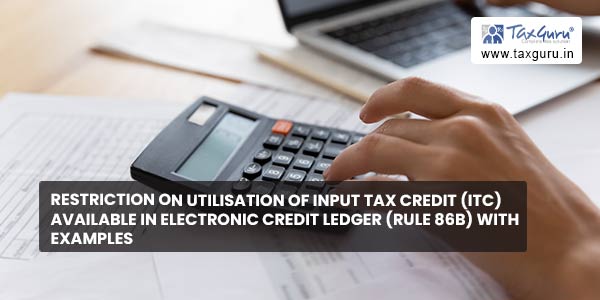Restriction on utilisation of Input Tax Credit (ITC) available in Electronic Credit Ledger (Rule 86B) with examples
A taxpayer who is liable to collect tax from the recipient of supply, should remit the same to the exchequer after deducting the tax paid by him as a recipient for the supplies he received in his account. However there are various restrictions for the utilisation of the tax paid by the taxpayer while discharging his output tax liability. He is able to utilise the tax paid by him, usually called as input tax credit, only when the same is finally remitted to the Government by the supplier.
Among such restrictions, Rule 86B restricts the utilisation of input tax credit available in the electronic credit ledger. Even though the supplier remits the full tax to the government, this rule restricts the recipient from utlising the credit to discharge the output tax liability in excess of 99%. This rule applies to those whose taxable value of the supplies other than exempt and zero rated supplies exceeds rupees fifty lakhs in a month.
For example, the total output tax liability of the taxpayer ‘ABC’ is Rs.20,50,000 in a month while he has input tax credit of Rs.30,00,000 available in his electronic credit ledger. Here, ‘ABC’ doesn’t have to pay tax as his input tax credit exceeds his output tax liability. He can adjust the input tax credit to the extent of Rs.20,50,000 to discharge his liability. But the rule 86B restricts the utilisation of full credit, hence he has to discharge 1% of the output tax liability by cash instead of using the credit available in the ledger. He has to discharge Rs.20500/- (i.e. 1% of his total output tax liability of Rs.20,50,000) by cash.

Rule 86B not only intends to restrict but also gives relief to the following taxpayers that these taxpayers are not restricted to utilise the full credit as long as they fulfill any one of the conditions laid down respectively, as below:
- The taxpayer or the proprietor or karta or the managing director or any of its two partners, whole-time directors, Members of Managing Committee of Associations or Board of Trustees, as the case may be, have paid income tax more than Rs.1 lakh under the Income tax Act,1961 in each of the last two financial years for which the time limit to file return of income under section 139(1) of the said Act has expired.
- The registered person has received a refund amount of more than one lakh rupees in the preceding financial year on account of unutilised input tax credit under any of the following clauses of first proviso of sub-section (3) of section 54:
(i) zero rated supplies made without payment of tax; or
(ii) accumulation of credit due to inverted tax structure
- The registered person has discharged his output tax liability by cash in excess of 1% of the total output tax liability, computed cumulatively from the beginning of the current financial year to the month in which the registered person has to discharge the liability.
For example, if the taxpayer ‘ABC’ has to pay output tax liability of Rs.20,50,000 in the month of June 2022 and input tax credit of Rs.30,00,000 as on date, he can utilise the full credit and no need to pay output tax by cash provided he had paid output tax liability by cash in excess of 1% of the total output tax liability, computed as below:
| Month/Year | Output Tax | Input Tax | Paid by cash |
| April 2022 | 15,00,000.00 | 14,50,000.00 | 50,000.00 |
| May 2022 | 12,00,000.00 | 12,00,000.00 | – |
| Jun 2022 | 20,50,000.00 | 30,00,000.00 | – |
| Total | 47,50,000.00 | 56,50,000.00 | 50,000.00 |
From the above, we know ABC has paid Rs.50000 by cash, calculated cumulatively from April to June, which is in excess of 1% of the total liability of Rs.47,50,000, i.e. Rs.47500.
For the month of May, he had already paid Rs.50000 by cash, calculated cumulatively from April to May, which is in excess of 1% of the total liability of Rs.27,00,000 (Apr to May), i.e. Rs.27000. So, no need to pay tax by cash.
- The registered person is a Government department or a public sector undertaking or a local authority or a statutory body.
Moreover, the commissioner or an officer authorised by the commissioner may relax the restriction after verifications and such safeguards as he may deem fit. The rule applies with effect from 1st January 2021, notified vide Notification No.94 /2020 – Central Tax dated 22nd December 2020.
Disclaimer: This article is only for the purpose of understanding the provisions of the Act, The author bears no responsibility on decisions taken by the readers whatsoever. E&OE.





